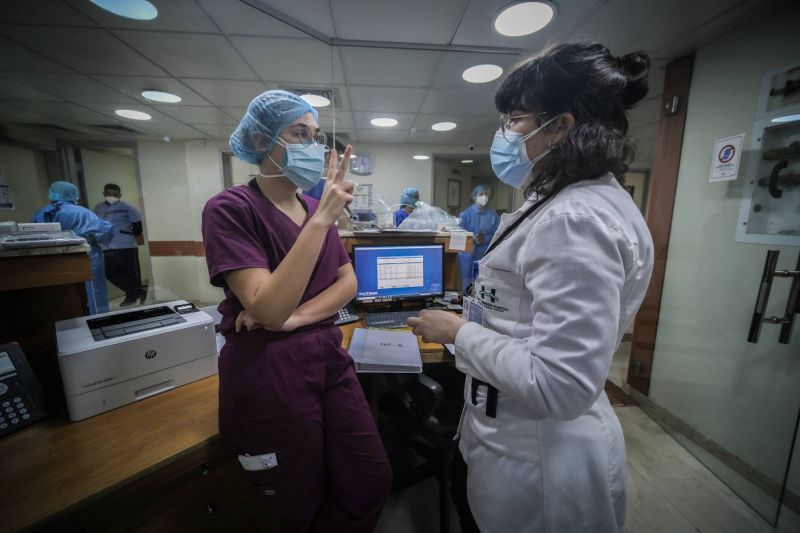
Medical staff at Mount Lebanon Hospital in Hazmieh, Baabda. (Credit: João Sousa/L’Orient Today)
BEIRUT — With Lebanon’s COVID-19 pandemic overwhelming hospitals, medical facilities are in critical need of more staff, including nurses, to boost capacity to handle the flood of people seeking treatment for the virus.
The Health Ministry, meanwhile, was scrambling to distribute much-needed equipment and shuffle a Qatari-donated field hospital to Beirut, as Lebanon continued to register frightening COVID-19 numbers Sunday, the fourth day of a strict lockdown.
Forty people died of the virus Sunday, while 744 people were in intensive care units nationwide. In its latest numbers, issued the day before, the World Health Organization said 774 ICU beds were available, slightly less than the figure of 820 beds in all hospitals cited by the head of the private hospitals’ syndicate, Sleiman Haroun.
Boosting this capacity will not be possible without more staff, even if equipped beds are made available, Myrna Doumit, the head of Order of Nurses, cautioned in a phone call with L’Orient Today.
Doumit added that nursing levels are not sufficient at present, saying the health care sector has long faced difficulties recruiting and retaining nurses.
“If I had 90 more beds, I could fill them quickly, but no more nurses are available,” said Elie Gharios, the medical director of Mount Lebanon Hospital in Hazmieh, Baabda.
His hospital is just one of many with critical staff shortages. In the coastal town of Bouar, north of Beirut, the public hospital issued a desperate call for nurses to email their CVs.
Mohammad Khodrin, a doctor at Abdullah Al Rassi Governmental Hospital in Halba, Akkar, said that the hospital’s ICU was not only at full capacity, it was sending patients away to other medical facilities and in need of more medical staff.
Pierre Bou Khalil, the head of pulmonary and critical care at the American University of Beirut Medical Center, painted a grim picture of the situation at one of the leading private hospitals in the capital.
“It’s a nightmare, it’s overwhelming,” he told L’Orient Today, adding that ICUs and the ER are full as the hospital tries to improve capacity, with all staff pitching in amid the dire circumstances.
In a statement issued Sunday morning, caretaker Health Minister Hamad Hassan, who himself has been receiving care for COVID-19 at the St. Georges Hospital in Hadath, said that one of the field hospitals donated by Qatar on Nov. 11 would be installed in Beirut instead of Sur.
Once again, staffing is an issue with the field hospital, which was proposed to be installed either near the Rafik Hariri University Hospital or the Sports City complex, which in better days hosted football matches at its stadium.
Firass Abiad, the head of RHUH, told L’Orient Today there is no physical space outside the hospital, Lebanon’s front-line center for handling the COVID-19 pandemic, which is why the nearby stadium was suggested.
But, he asked, “From where are we going to get the staff? Finally, it will also require an operational budget, where will it come from?”
MP Inaya Ezzedine (Amal/Sur) said the field hospital was not a logical fit for installation in the southern city, which has three private hospitals lacking space nearby them for such a facility, while the lone public hospital was ill-equipped.
“To be able to equip such a hospital, you need billions of Lebanese pounds, which is not available; we’d rather this money be spent on equipping existing hospitals,” she said.
The medical doctor reiterated her earlier call on the caretaker premier, Hassan Diab, and health minister to allocate resources and equipment for the private hospitals in Sur, which she emphasized have been bearing the brunt of the COVID-19 pandemic since its outbreak last year.
“In Sur, we have about 3,000 active cases of COVID-19, with patients waiting in ER,” she said, adding that hospitals there are at full capacity.
Staffing levels are a problem in Sur as elsewhere, Ezzedine said, saying that even if hospitals were fully equipped, they would need personnel.
The health minister in his Sunday morning statement also brought up the field hospitals planned for Tripoli and nearby Sir al-Dinnieh. MP Ali Darwish (Azm/Tripoli) said that the Tripoli municipality will allocate LL300 million for the city’s facility, adding that there is yet no specific time frame for when it will be ready.
As the nightmarish situation continues to deteriorate, Lebanese authorities face this week the decision whether they will extend the total lockdown set to expire Jan. 25. A 24-hour curfew has been in place since Thursday.
Caretaker Industry Minister Imad Hoballah told L’Orient Today that he supports extending the strict lockdown past its current deadline, while reiterating his stance that critical industries, including packaging facilities for food and medicine, be exempted.
The upcoming decision on the lockdown is bound to be crucial. Six more professionals in the overwhelmed health sector tested positive for COVID-19, according to Sunday’s figures, with the initial batches of vaccines from Pfizer not set to arrive until early February at the earliest.
Since New Year’s Eve, when nightlife venues were open for revelers despite warnings, 71,310 people have tested positive for COVID-19, or a startling 28.2 percent of all of Lebanon’s cases since the virus appeared in the country nearly 11 months ago.